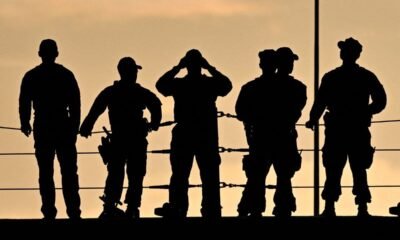INTERNACIONAL
GOP reps, advocacy group to target competitive House districts in Trump tax-cut push
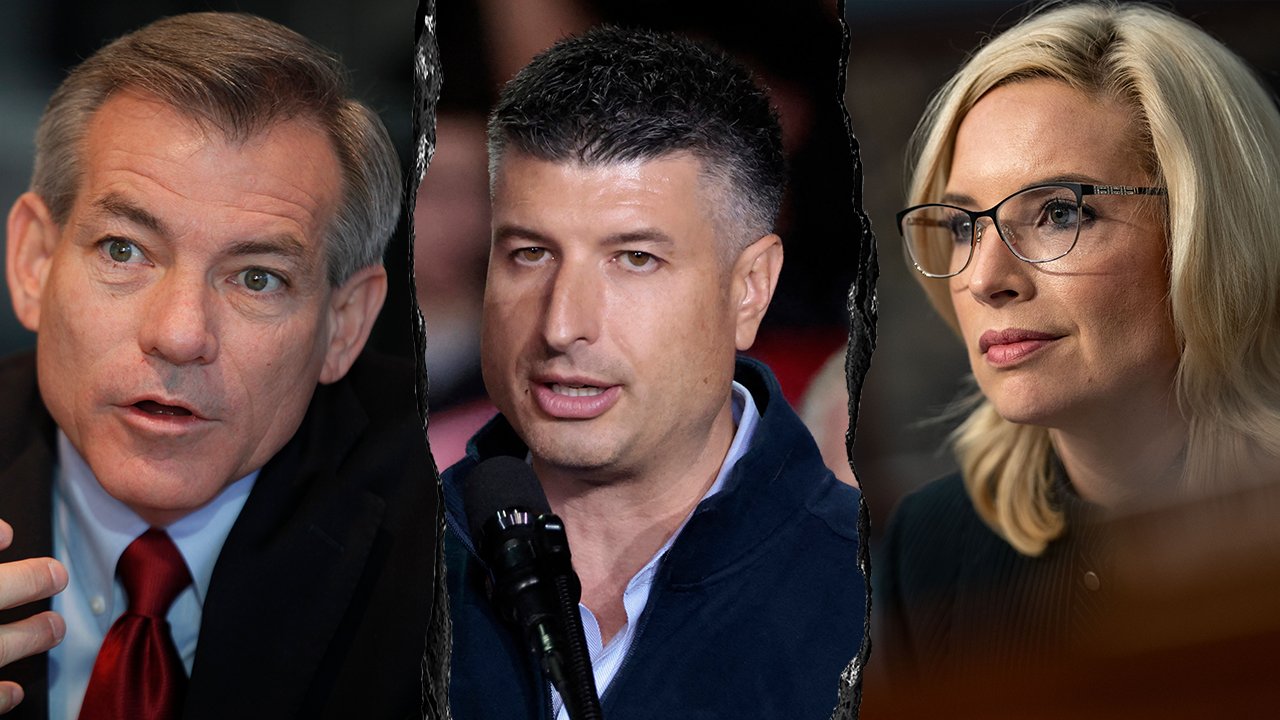
EXCLUSIVE: Americans for Prosperity (AFP) is hosting a day of action on Saturday in competitive congressional districts as House Republicans iron out the details of President Donald Trump’s «big, beautiful bill.»
AFP is teaming up with GOP Reps. David Schweikert and Juan Ciscomani of Arizona, Ashley Hinson of Iowa, Tom Barrett of Michigan and Ryan Mackenzie of Pennsylvania for door-knocking, phone banks and grassroots organizing in a show of support for extending Trump’s 2017 Tax Cuts and Jobs Act (TCJA).
Canvassers will encourage constituents in Arizona, Iowa, Michigan and Pennsylvania to urge their senators and representatives to extend Trump’s tax cuts as a key component of his «big, beautiful bill.»
«Working families and small businesses throughout the country are counting on Congress to act as soon as possible to renew President Trump’s tax cuts,» AFP Managing Director Kent Strang said in a statement to Fox News Digital ahead of the day of action.
CONGRESSIONAL DEMOCRATS TARGETING DOZENS OF HOUSE REPUBLICAN-HELD SEATS IN 2026 MIDTERM BATTLE FOR MAJORITY
From left: GOP Reps. David Schweikert of Arizona, Tom Barrett of Michigan and Ashley Hinson of Iowa are joining Americans for Prosperity in a day of action on Saturday. (Getty Images)
«With support from AFP’s activists bringing their unmatched energy and drive this weekend, we can ensure we extend pro-growth tax policy and help Republicans prevent the largest tax hike in history from crushing the middle class.»
REPUBLICANS TO TAKE AIM AT THESE 26 DEMOCRAT-HELD HOUSE SEATS IN 2026 MIDTERMS
AFP is launching their day of action in conjunction with their $20 million «Protect Prosperity» campaign, which the conservative advocacy group has called the single largest investment of any outside group dedicated to preserving the Tax Cuts and Jobs Act.
As House Republicans searched for alternative ways to offset an extension of the 2017 tax cuts and Trump’s ambitious goals to cut taxes on tips, overtime and Social Security, AFP urged Republicans to offset budget cuts by eliminating former President Joe Biden’s «Green New Deal giveaways.»
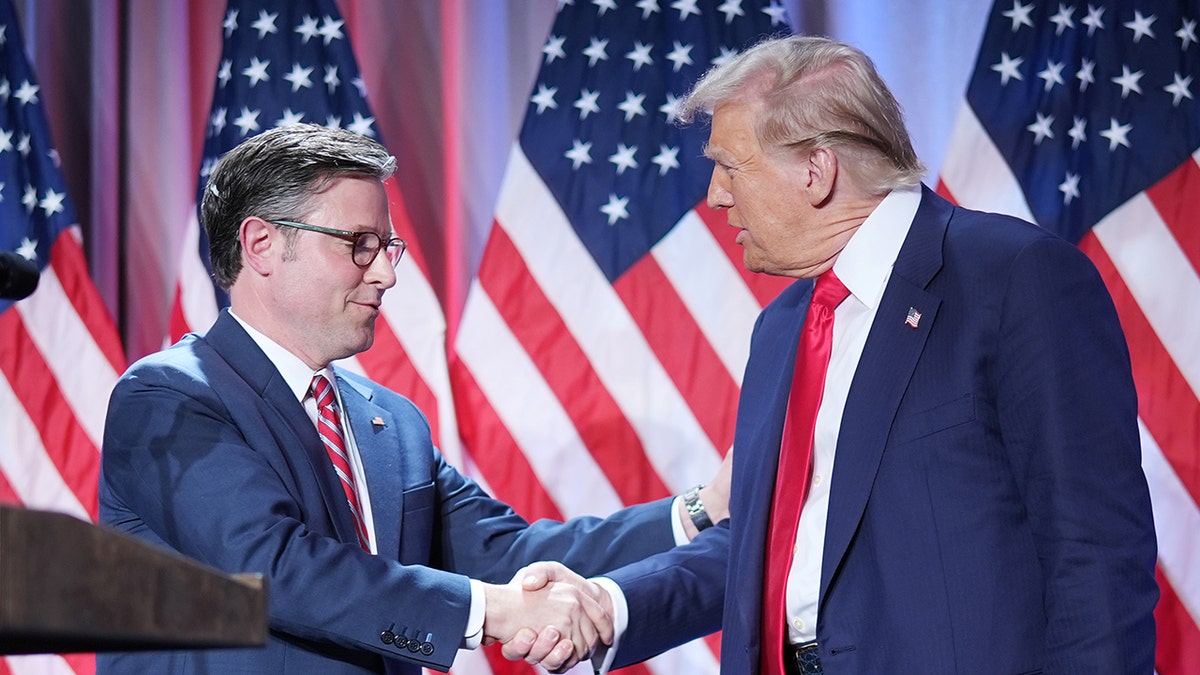
House Speaker Mike Johnson, R-La., left, is leading House Republicans’ negotiations on President Donald Trump’s «big, beautiful bill.» (Andrew Harnik)
The House Energy and Commerce Committee debated green energy cuts during their lengthy markup on Capitol Hill this week as part of the House budget reconciliation process.
Meanwhile, House Republicans debated potentially raising taxes as Trump indicated his support for a small tax hike to fund his «big, beautiful bill.» While rumors swirled among House Republicans for weeks that the White House was floating a tax hike on millionaires, Trump confirmed on Friday he would be «OK if they do.»
However, House Republicans seemed to drop their plans for a new millionaire’s tax hike as the reconciliation began. The House Ways and Means Committee released nearly 400 pages of legislation on Monday that did not include a tax hike.
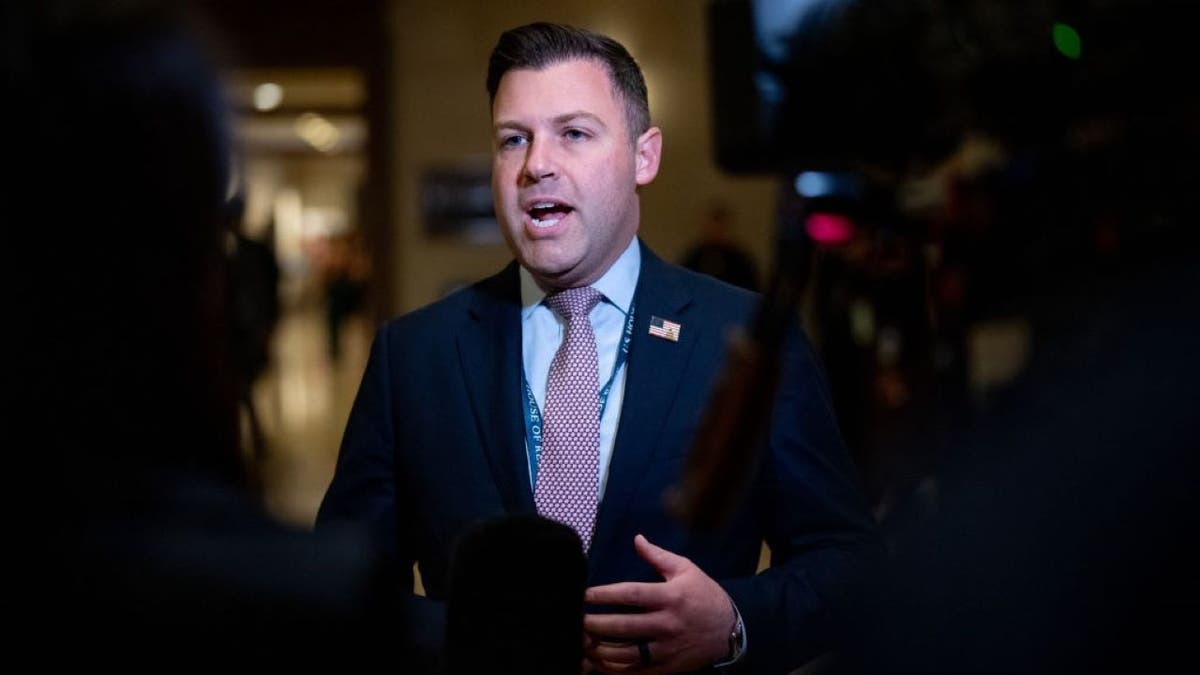
Rep. Ryan Mackenzie, R-Pa., flipped his competitive House district from blue to red in 2024. (Andrew Harnik/Getty Images)
It’s no coincidence that AFP is focusing its attention on competitive districts in Arizona, Iowa, Michigan and Pennsylvania, as contentious races are expected in 2026.
In Arizona’s sixth congressional district, Ciscomani won his House seat in 2022 with just over 50% of the vote. Schweikert narrowly won Arizona’s first congressional district by less than 2% of the vote in 2022 and 2024, as one of the most expensive House races in the country last year.
And while Hinson won by a much larger margin in Iowa’s second congressional district, Democrat Kevin Techau has already announced his campaign to unseat Hinson.
CLICK HERE TO GET THE FOX NEWS APP
Both Barrett in Michigan and Mackenzie in Pennsylvania managed to pick up Republican House seats in 2024, flipping their congressional districts from blue to red. Democrats will likely seek to win those seats back in 2026.
Politics,House of Representatives Elections,House Budget
INTERNACIONAL
María Corina Machado emerges as top potential successor after Máduro’s fall

NEWYou can now listen to Fox News articles!
The successors to the ousted authoritarian Venezuelan dictator Nicolás Maduro are likely to be the 2025 Nobel Peace Prize winner and opposition leaders María Corina Machado and Edmundo González, according to an expert on Caracas.
Jorge Jraissati, a Venezuelan who is the president of the Economic Inclusion Group, told Fox News Digital that «Machado and Gonzalez would assume a transitional government in Venezuela. They have the support of 70% of Venezuelans. They would lead this transition period.» He added that «I believe Machado has the capacity and integrity to lead this very delicate transition. Key will be her ability to surround herself with young and capable Venezuelans instead of career politicians.»
The United States recognized González as the legitimate leader of Venezuela after he soundly defeated Maduro by a more than two-to-one margin in the 2024 election. González replaced Machado after she was banned from running for the presidency by the Maduro-run high court. Maduro ignored the results.
VENEZUELAN DISSIDENT MACHADO CREDITS TRUMP FOR ADVANCING FREEDOM MOVEMENT, DEDICATES NOBEL TO HIM
Opposition coalition presidential hopeful Maria Corina Machado speaks to supporters at a campaign event in Caracas, Venezuela, Jan. 23, 2024.
While Machado has yet to comment on Maduro’s fall, just last month she told Fox News Digital that «I am absolutely grateful to President Donald Trump for every gesture, every signal and every moment that he has stood with the Venezuelan people. I have watched it very closely, and I know what it has meant for those who are fighting to reclaim democracy and freedom in our country.»
Having been announced as the winner of the Nobel Prize in December, Machado, who was hiding at the time because of Maduro’s efforts to purge the opposition, said about the award and committee, «I am very grateful to them, and this is a measure of what this recognition means to the Venezuelan people.»
TRUMP CONFIRMS US STRIKE IN VENEZUELA, SAYS PRESIDENT NICOLAS MADURO HAS BEEN ‘CAPTURED’
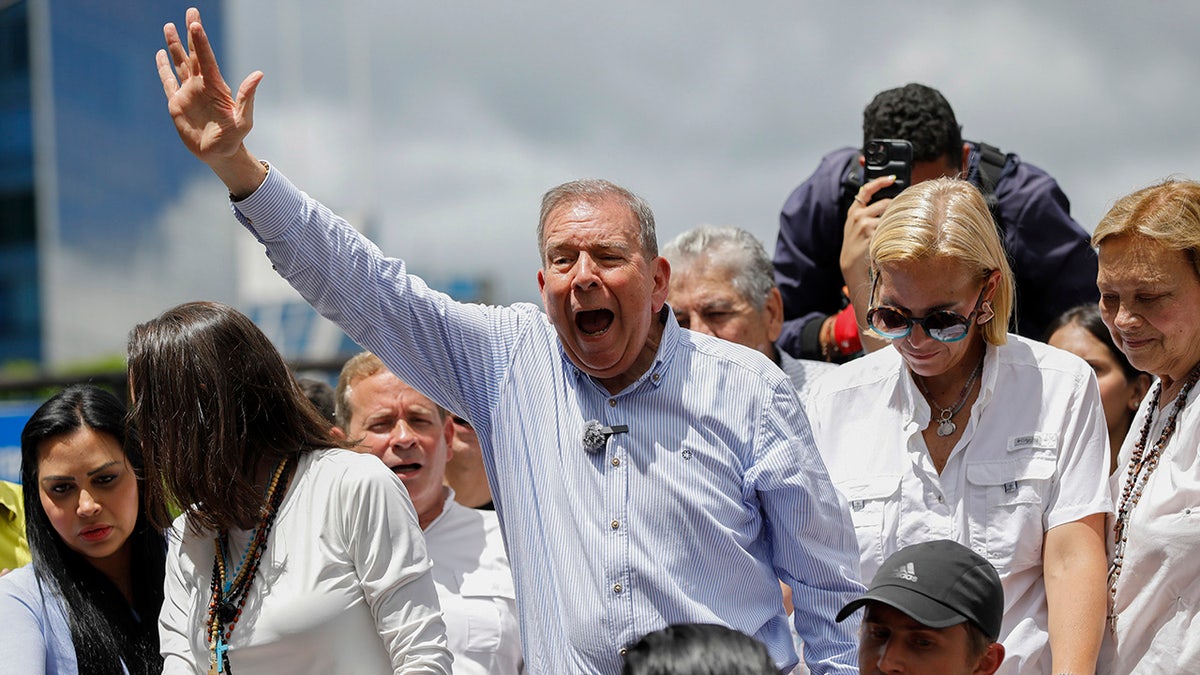
Opposition presidential candidate Edmundo Gonzalez leads a demonstration against the official election results that declared that President Nicolás Maduro won reelection in Caracas, Venezuela, July 30, 2024. (AP Photo/Cristian Hernandez) (AP Photo/Cristian Hernandez)
Her daughter, Ana Corina Sosa, who accepted her Nobel Prize in Norway, said that her mother «wants to live in a free Venezuela» and «will never give up on that purpose.» Machado would later appear in Norway following a daring operation to get her out of the country.
Sosa’s prediction appears to have crystallized having said, «That is why we all know, and I know, that she will be back in Venezuela very soon.» Machado dedicated her Nobel to both Trump and the «suffering people of Venezuela.»

Nobel Peace Prize laureate María Corina Machado waves at the Grand Hotel in Oslo, Norway, early Thursday, Dec. 11, 2025. (Lise Åserud/NTB Scanpix via AP)
If either opposition leader María Corina Machado or Edmundo González fail to fill the vacuum in a post-Maduro Venezuela, experts point to a crowded field of dangerous actors who could attempt to seize power now that Maduro is out.
Diosdado Cabello
Diosdado Cabello emerges as the most feared and influential figure in the regime. La Nación describes him as the longtime number two of Chavismo, with sweeping control over party machinery and the propaganda apparatus. His power stretches from internal political enforcement to the interior and justice portfolios.
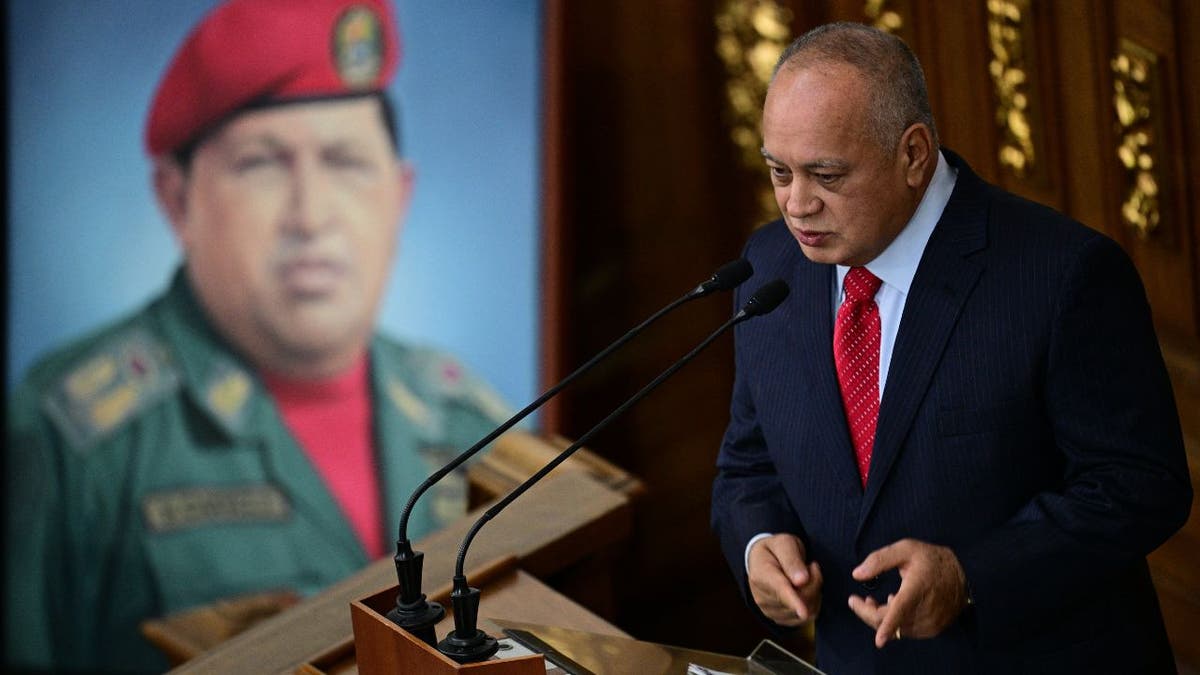
Venezuela’s Interior Minister Diosdado Cabello speaks next to a painting of the late Venezuelan President Hugo Chavez during a session at the National Assembly in Caracas on September 17, 2024. «He is more of a hard-liner who has been pretty critical of any sort of negotiations and dialogue with the opposition,» experts say. (Federico Parra / AFP)
MADURO’S HEIRS: HUMAN RIGHTS VIOLATORS, CORRUPT ENFORCERS AND RUTHLESS LOYALISTS
Jorge Rodríguez
Jorge Rodríguez, president of the National Assembly and one of Maduro’s closest political operators, is another senior figure positioned for any succession scenario. La Nación highlights his prominence inside the ruling elite, noting his roles as mayor, communications minister and key strategist.
Delcy Rodríguez
Delcy Rodríguez, Venezuela’s vice president, is described as a central political operator within the regime and part of a powerful governing duo with her brother Jorge. Her influence spans institutional, economic and diplomatic spheres. The U.S. Treasury sanctioned Rodríguez as part of Maduro’s inner circle for helping dismantle democratic governance, and the European Union lists her under measures for human rights violations and the erosion of the rule of law.

Venezuela’s President Nicolás Maduro (2nd R) waves next to First Lady Cilia Flores, Vice President Delcy Rodriguez. (Federico Parra/AFP via Getty Images)
Iván Hernández Dala
Ivan Hernández Dala heads Venezuela’s military counterintelligence service (DGCIM) and commands the presidential guard, making him one of the most feared figures in the security apparatus. His control over internal repression gives him significant leverage in any power struggle. He was designated by the State Department in 2019 for his involvement in gross violations of human rights.

In this April 13, 2019, file photo, Venezuela’s President Nicolás Maduro, speaks flanked by Defense Minister Vladimir Padrino Lopez, right, and Gen. Ivan Hernandez, second from right, head of both the presidential guard and military counterintelligence in Caracas, Venezuela. (Ariana Cubillos/AP Photo)
Vladimir Padrino López
Vladimir Padrino López, Venezuela’s long-serving defense minister, is portrayed by La Nación as the backbone of the military establishment and the guarantor of Maduro’s survival. The armed forces remain loyal because of him, forming an axis of power between Padrino and Maduro.
CLICK HERE TO DOWNLOAD THE FOX NEWS APP
In an interview with Fox News Digital in December, Jason Marczak, vice president and senior director at the Atlantic Council’s Adrienne Arsht Latin America Center, said, «A win isn’t just Nicolás Maduro leaving. . . . A win is actually a transition to democratic forces.»
venezuelan political crisis,donald trump,conflicts,south america
INTERNACIONAL
Edmundo González: “Ninguna transición democrática es posible mientras haya venezolanos encarcelados de manera injusta”

El presidente electo de Venezuela, Edmundo González Urrutia, afirmó este domingo que la captura de Nicolás Maduro y su salida del país abrieron un nuevo escenario político, pero advirtió que ese hecho, por sí solo, no garantiza una transición democrática.
En un mensaje difundido este domingo en sus redes sociales, González Urrutia sostuvo que la normalización institucional de Venezuela solo será posible con la liberación inmediata de todos los presos políticos y con el respeto pleno al mandato popular expresado en las elecciones del 28 de julio de 2024.
Señaló, además, que los últimos días marcaron “un punto de inflexión” en la historia reciente del país y reconoció que el proceso genera reacciones encontradas dentro de la sociedad venezolana. Sin embargo, subrayó que la ausencia del dictador depuesto no reemplaza las tareas pendientes.
“Este hecho configura un nuevo escenario político, pero no sustituye las tareas fundamentales que aún tenemos por delante”, afirmó.
El presidente electo venezolano calificó a los presos políticos como “rehenes de un sistema de persecución” y sostuvo que ninguna transición puede avanzar mientras persista esa realidad.
“La liberación inmediata e incondicional de los presos políticos civiles y militares es ineludible”, expresó, al tiempo que remarcó que muchos de ellos fueron encarcelados por exigir derechos o por cumplir con deberes constitucionales.
En su mensaje, González Urrutia insistió en que la legitimidad de su liderazgo se apoya en el resultado electoral y en lo establecido por la Constitución venezolana.
Citó el artículo 5 de la Carta Magna, que consagra la soberanía popular, para reafirmar que su autoridad emana del voto ciudadano. “Nuestra legitimidad proviene del mandato popular y del respaldo claro de millones de venezolanos”, afirmó, y añadió que ese respaldo “jamás será traicionado”.
El presidente electo buscó diferenciar su discurso del clima de confrontación que ha marcado la política venezolana en los últimos años. Aseguró que su espacio actúa con “sentido de Estado” y con el objetivo de construir una transición basada en reglas claras. Según explicó, ese proceso debe asentarse en el respeto a la ley, en instituciones funcionales y en un compromiso explícito con la dignidad de los ciudadanos.

El mensaje también estuvo dirigido a la Fuerza Armada Nacional y a los cuerpos de seguridad del Estado. González Urrutia les pidió cumplir el mandato expresado en las urnas y recordó que su lealtad institucional no es con personas ni proyectos políticos, sino con la Constitución y la República. “Su deber es cumplir y hacer cumplir el mandato soberano expresado el 28 de julio”, señaló, al identificarse como comandante en jefe conforme al marco constitucional.
González Urrutia también hizo hincapié en la unidad nacional como condición para la reconstrucción del país. En su intervención habló de la necesidad de “sanar” a una sociedad marcada por la polarización y de garantizar que el poder no vuelva a utilizarse contra la población. En ese marco, planteó un horizonte de “verdad, justicia y reconciliación”, dejando en claro que la búsqueda de estabilidad no puede implicar impunidad.
El mensaje cerró con una definición del proyecto que propone para la etapa que viene. González Urrutia describió un país basado en derechos, instituciones y esperanza, y afirmó que ese objetivo requiere un esfuerzo colectivo.
“El país que viene debe ser un país de derechos, de instituciones y de esperanza”, expresó, al convocar a los venezolanos a participar en la reconstrucción democrática.
La declaración del presidente electo delineó las prioridades políticas inmediatas tras la caída del liderazgo de Maduro: presos políticos, respeto electoral y subordinación de las fuerzas armadas al orden constitucional.
INTERNACIONAL
From bus driver to dictator: Nicolás Maduro’s rise and fall in Venezuela

Trump announces capture of Venezuela’s Maduro, wife
Fox News’ Lucas Tomlinson provides details on President Donald Trump’s announcement that Venezuelan leader Nicolás Maduro and his wife were captured and flown out of the country during what Trump described as a ‘large-scale strike.’
NEWYou can now listen to Fox News articles!
The Venezuelan dictator captured by the Trump administration worked as a bus driver and union organizer before his ascent through the South American country’s political system, where he ultimately became a wanted man by the U.S. with a $50 million reward for information leading to his arrest.
Nicolás Maduro was «captured and flown out of the country» early Saturday following a «large-scale strike» by the U.S. military, according to President Donald Trump.
The actions mark a stunning fall for Maduro, who was serving his third term as president of Venezuela. He led an administration that grappled with economic challenges, mass protests, disputed election results and allegations of narco-trafficking.
Maduro was born in Venezuela’s capital of Caracas on Nov. 23, 1962. As a young man, he was sent to communist Cuba in 1986 for a year of ideological instruction — his only studies after high school.
LIVE UPDATES: TRUMP CONFIRMS OVERNIGHT STRIKES IN VENEZUELA, SAYS US HAS ‘CAPTURED’ MADURO
Venezuela’s President Nicolás Maduro addresses members of the armed forces, Bolivarian Militia, police, and civilians during a rally against a possible escalation of U.S. actions toward the country, at Fort Tiuna military base in Caracas, Venezuela, on Nov. 25, 2025. (Leonardo Fernandez Viloria/Reuters)
Upon returning home, Maduro found work as a bus driver and union organizer. He embraced the late Venezuelan President Hugo Chávez after the then-army paratrooper in 1992 staged a failed coup against an unpopular austerity government. Around the same time, he met his longtime partner, Cilia Flores, a lawyer for the jailed leader.
After Chávez was freed and elected president in 1998, Maduro, a young lawmaker, helped push his agenda of redistributing the OPEC nation’s oil wealth and political power.
In 2000, Maduro was elected to Venezuela’s National Assembly. He later became the president of the National Assembly in 2005.
Then in 2006, Chávez appointed Maduro as Venezuela’s foreign minister. Six years later, Maduro was appointed as Venezuela’s vice president.
When Maduro took power in 2013 following his mentor’s death from cancer, he struggled to bring order to the grief-stricken nation. Without «El Comandante» in charge, the economy entered a death spiral — shrinking 71% from 2012 to 2020, with inflation topping 130,000% — and opponents and rivals inside the government saw an opportunity.
Less than a year into Maduro’s presidency, hardliner opponents launched demonstrations demanding his exit.
VENEZUELA ARRESTS MORE AMERICANS AS TRUMP RAMPS UP PRESSURE ON MADURO: REPORT

Government supporters display posters of Venezuelan President Nicolás Maduro, right, and former President Hugo Chávez in downtown Caracas, Venezuela, on Saturday, Jan. 3, 2026, after U.S. President Donald Trump announced that Maduro had been captured and flown out of the country. (Matias Delacroix/AP)
Leaning heavily on Venezuela’s security forces, Maduro crushed the protests. However, with supermarket shelves empty amid widespread shortages, they resumed with more intensity three years later, leaving more than 100 people dead. In 2018, the International Criminal Court initiated a criminal investigation into possible crimes against humanity.
The crackdown continued into the 2018 presidential race, which the opposition boycotted when several of its leaders were barred from running. Dozens of countries led by the U.S. condemned Maduro’s first re-election as illegitimate and recognized Juan Guaidó, the head of the National Assembly, as Venezuela’s elected leader.
«Since 2019, more than 50 countries, including the United States, have refused to recognize Maduro as Venezuela’s head of state,» the State Department said in a profile of Maduro on its website.
«Maduro helped manage and ultimately lead the Cartel of the Suns, a Venezuelan drug-trafficking organization comprised of high-ranking Venezuelan officials. As he gained power in Venezuela, Maduro participated in a corrupt and violent narco-terrorism conspiracy with the Revolutionary Armed Forces of Colombia (FARC), a designated Foreign Terrorist Organization,» it added.
TREASURY TARGETS OIL TRADERS, TANKERS ACCUSED OF HELPING MADURO EVADE US SANCTIONS

Demonstrators confront police as they protest against the government of President Nicolas Maduro in Caracas, on Feb. 22, 2014. (Carlos Garcia Rawlins/Reuters)
«Maduro negotiated multi-ton shipments of FARC-produced cocaine; directed the Cartel of the Suns to provide military-grade weapons to the FARC; coordinated with narcotics traffickers in Honduras and other countries to facilitate large-scale drug trafficking; and solicited assistance from FARC leadership in training an unsanctioned militia group that functioned, in essence, as an armed forces unit for the Cartel of the Suns,» the State Department continued.
«In March 2020, Maduro was charged in the Southern District of New York for narco-terrorism, conspiracy to import cocaine, possession of machine guns and destructive devices, and conspiracy to possess machine guns and destructive devices,» it also said.
Maduro was re-elected again in 2024 in another disputed election.
«Given the overwhelming evidence, it is clear to the United States and, most importantly, to the Venezuelan people that Edmundo González Urrutia won the most votes in Venezuela’s July 28 presidential election,» then-Secretary of State Antony Blinken said at the time.
TRUMP SUGGESTS US HIT ‘BIG FACILITY’ IN VENEZUELA DRUG FIGHT

Acting Venezuelan President Nicolas Maduro waves to supporters as he leaves after voting for the successor to the late President Hugo Chavez, in Caracas on April 14, 2013. (Carlos Garcia Rawlins/Reuters)
Maduro then delivered a fiery inauguration speech in January 2025, likening himself to a biblical David fighting Goliath and accusing his opponents and their supporters in the U.S. of trying to turn his inauguration into a «world war.»
He said his enemies’ failure to block his inauguration to a third six-year term was «a great victory» for Venezuela’s peace and national sovereignty.
«I have not been made president by the government of the United States, nor by the pro-imperialist governments of Latin America,» he said, after being draped with a sash in the red, yellow and blue of Venezuela’s flag. «I come from the people, I am of the people, and my power emanates from history and from the people. And to the people, I owe my whole life, body and soul.»
Months later, Attorney General Pam Bondi announced a $50 million reward for information leading to Maduro’s arrest.
CLICK HERE TO DOWNLOAD THE FOX NEWS APP
«Maduro uses foreign terrorist organizations like TdA (Tren de Aragua), Sinaloa and Cartel of the Suns (Cartel de Soles) to bring deadly violence to our country,» Bondi said in a video message in August 2025. «He is one of the largest narco-traffickers in the world and a threat to our national security.»
Fox News’ Michael Sinkewicz, Lucas Y. Tomlinson, Louis Casiano and The Associated Press contributed to this report.
venezuelan political crisis,south america,donald trump,foreign policy,narco terror,state department,world

 CHIMENTOS2 días ago
CHIMENTOS2 días agoNoelia Marzol subió un video con su marido y encendió la polémica: “Momento de lujuria”

 INTERNACIONAL2 días ago
INTERNACIONAL2 días ago🔴URGENTE – Trump aseguró que «Nicolás Maduro y su esposa han sido capturados y sacados de Venezuela»

 ECONOMIA2 días ago
ECONOMIA2 días agoCuál es el límite para extraer efectivo en los cajeros automáticos a partir de enero 2026











